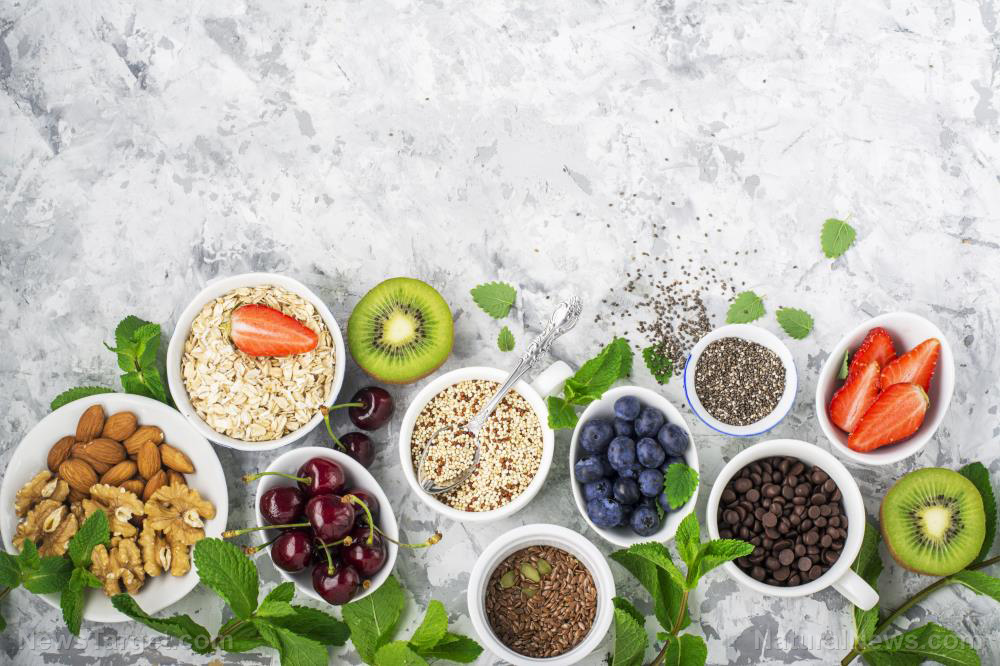Small but healthful: Here are 8 berries that boast a fantastic nutritional profile
08/26/2020 / By Divina Ramirez

Berries boast a formidable reputation in the realm of health foods. Chock-full of antioxidants, berries can keep mental faculties sharp in later life and protect against the toughest chronic diseases, including cancer.
Potent organic compounds and immune-boosting plant pigments in berries can also confer a long list of health benefits, including better blood pressure control, good digestion and significant reductions in cholesterol.
Healthiest berries
But although all berries share more or less the same benefits and essential nutrients, some are far healthier than others.
In one of his recent articles published online, nutritionist and microbiologist Ruairi Robertson shared eight of the healthiest berries that people can eat as part of their regular diets.
Blueberries
Superfoods lists often feature blueberries – and for good reason. Rich in antioxidants, fiber, potassium and manganese, these berries are ideal for boosting immune health.
Recent studies also found that blueberries can reduce the amount of bad cholesterol in the bloodstream, thus promoting better blood circulation and heart health.
One such research, published in the American Journal of Clinical Nutrition, demonstrated that eating just 150 g of blueberries daily reduces the risk of heart disease by up to 15 percent.
Raspberries
One of the most striking features of raspberries’ nutritional profile is their high ellagic acid content. Plants produce this compound as a defense mechanism against infection and pests.
But studies find that it is also potent against cancer. In 2018, Italian researchers examined studies on the anti-cancer effect of ellagic acid and found that it could inhibit cancer cell migration and tumor formation.
In addition, black raspberries are hailed for their beneficial effects on markers of heart disease, such as high blood pressure and high cholesterol.
Goji berries
Goji berries, medicinal berries endemic to China, are abundant in vitamin A, an essential micronutrient for good vision. These berries also boast significant amounts of zeaxanthin, a plant pigment that protects the eyes from the harmful effects of blue light that digital devices often emit.
In 2011, a randomized controlled trial (RCT) featuring older adults aged 65 to 70 demonstrated that the regular consumption of a milk-based formulation of goji berries protected the participants from the beginning signs of age-related macular degeneration.
Bilberries
Bilberries, the European counterpart to blueberries, contain just 43 calories per cup, making it the ideal fruit snack for people conscious of their food intake.
Multiple studies indicate that bilberries are potent against inflammation. One RCT in 2012 demonstrated that the regular consumption of bilberries reduced the expression of genes linked to inflammation.
On the other hand, an earlier RCT demonstrated that the month-long consumption of bilberries can enhance markers implicated in the onset of heart disease.
Cranberries
These tart berries are one of the go-to remedies for treating urinary tract infection, a common bacterial infection that causes a frequent urge to urinate and a burning or painful sensation during urination.
Cranberries’ antibacterial effects can be attributed to the antioxidants found in their skin. Therefore, in treating infections, it’s better to eat the berries as-is instead of drinking their juice.
Grapes
The skin of these common berries hold a significant amount of antioxidants, so it’s best to consume them as-is. In terms of their health benefits, studies found that phenolic compounds in grapes can reduce both blood pressure and heart rate.
Other studies also suggest that the regular consumption of grapes can slash diabetes risk and improve cognitive abilities.
Acai berries
Brazil’s acai berries, although one of the least popular berries on this list, can contain ten times more antioxidants than blueberries.
Studies found that consuming these berries can lead to a significant increase in blood antioxidant levels and minimize oxidative stress, to boot.
The pulp of these berries is also reported to reduce blood sugar and cholesterol in obese adults at risk of diabetes. (Related: Acai found to prevent renovascular hypertension-related abnormalities.)
Strawberries
One cup of strawberries is loaded with over 100 mg of vitamin C, almost as much as a cup of fresh orange juice.
Strawberries also provide modest amounts of other essential micronutrients, including calcium, magnesium, folate and potassium.
This combination of minerals helps to reduce high blood pressure and other risk factors for heart disease, including high cholesterol, inflammation and oxidative stress.
Berries are delicious, snackable fruits abundant in fiber, essential micronutrients and beneficial plant compounds to keep our health in check. Incorporate them into a balanced diet to reap their numerous health benefits.
Learn more about the health benefits attributed to different berries at Fruits.news.
Sources include:
Submit a correction >>
Tagged Under:
This article may contain statements that reflect the opinion of the author
RECENT NEWS & ARTICLES
COPYRIGHT © 2017 SUPER FOODS NEWS





















